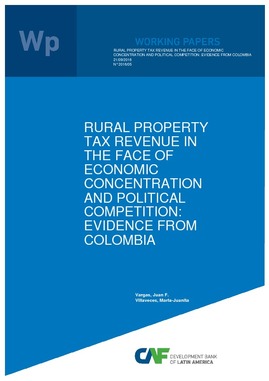Rural Property Tax Revenue in the Face of Economic Concentration and Political Competition: Evidence from Colombia
Resumen
We study the relationship between two sources of political power and property tax revenues in contemporary rural Colombia. First, de jure political power is the extent to which local political elites can capture the public administration for their own benefit. Second, de facto political power is the extent to which economically powerful landowners can influence policy. Using a panel of municipalities, we show that places with either high economic or high political concentration raise more taxes, but places with both high political and economic concentration perform worse.
Materia
País / Región
Fecha
2016-09-21Citar de esta publicación
Item perteneciente a la Colección

Autor
Vargas, JuanVillaveces, Marta-Juanita


